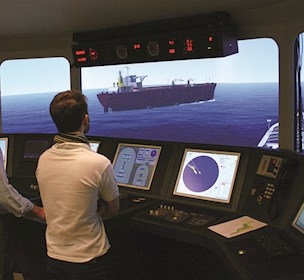Emergency Response Management
In order to improve handling of emergency situations, participants will be trained in manoeuvring ships in all conditions, ensuring the right establishment of watch keeping procedures and being aware of machinery malfunctions.
Goals and objectives
With the Emergency Response Management training program, the participants will develop and deepen their knowledge within navigation and marine engineering at management level. The course will, in particular, focus on how to manoeuvre and handle a ship in all conditions. Moreover, the course will ensure the right establishment of watch-keeping arrangements and procedures. Lastly, the participants will be trained in detecting and identifying the causes of machinery malfunctions and in correcting faults. The training program is suitable for full bridge crews or for senior officers on their own.
Course description
According to statistics, most accidents at sea have their root cause in human error. A well-trained crew that is regularly updated on relevant theory, handling of difficult and complex situations, efficient teamwork and shared situational awareness will reduce the rate of accidents and incidents.
Emergency Response Management training focuses on the use of back-up systems in stressful situations, i.e. collision, grounding, extreme weather, extreme behaviour of other ships, equipment failure, crew errors, man over board and evacuation of passengers.
- Since the emergency response management courses address both human factors elements and ship handling elements, it would be a great advantage if the participants have completed a course in ship handling and in crew resource management before attending this course.
The advantage of the course is that the exercises are carried out in the simulators with a high level of realism.
Useful evaluation
FORCE Technology has, in cooperation with the Danish National Research Laboratories (RISØ), developed an objective evaluation method. During the evaluation, navigational instructors and an optional cognitive psychologist observe the participants. The performance of the individual participant is described in the report which is generated after the exercise.
References: STCW including 2010 Manila amendments, 2017 edition. Table A-II/1 and A-II/2


